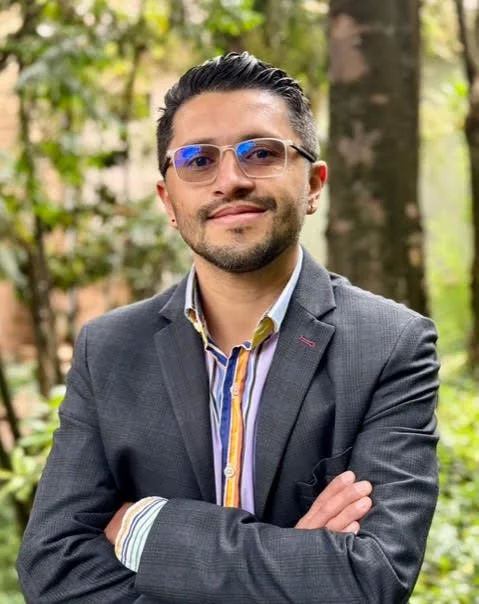Hans Cabra, Assistant Professor at Universidad de los Andes
For this installment of our “Get to Know a LEARN Scholar” we sat down with Hans Cabra, a newly appointed Assistant Professor at Universidad de los Andes and one of seven early- to mid- scholars from Colombia participating in the LEARN (Leverage, Empower, Advance Research Network) capacity exchange program. Hans’s research focuses on how access to durable goods, such as washing machines, computers and internet access, can influence educational outcomes of students from low-income households.
Q: I’m curious, what first sparked your interest in education?
A: I’m from Bogotá, Colombia, and I grew up in a low-income neighborhood. My mother has only an elementary school education, and my father made it through middle school, so the idea of going to college once felt impossible. I attended a public school supported by an NGO for low-income families, so the idea of going to university wasn't really on my mind. However, when I was 16, I received a scholarship to study in Norway at one of United World Colleges, a global movement that uses education to empower youth to become agents of change by nurturing leadership and social awareness skills . At the time, I didn’t speak English and had never been on a plane before. That trip truly ignited my passion for education.
In Norway, I was the only Colombian among nearly 200 international students. I had to learn English from scratch while catching up in math, science, and the humanities. That’s when I realized that education is not just about grades, it’s also about how to learn, and that learning itself is a process.
Later, I earned a scholarship to study Political Science and French at Middlebury College in Vermont, then spent a year in Paris at La Sorbonne studying philosophy and politics. I returned to Colombia for my master’s in Public Policy at Universidad de los Andes, focusing on youth and opportunity creation. After these opportunities abroad, I returned and still live in the same neighborhood where I grew up. Education changed my life; that’s why I’m passionate about it.
Q: Wow, that’s amazing. How did you decide to study the relationship between durable goods and education?
That actually touches on something very personal for me. As I said earlier, I grew up poor, and we didn’t have a washing machine when I was a kid. Every Friday, I’d spend four or five hours scrubbing all my and my brother’s clothes by hand.
When I came home from Norway one Christmas, my mom had taken out a loan to buy our first washing machine. I remember how fascinated my grandmother was with it; she would stand next to it, watching in awe. Later, I saw a TED Talk in which a man shared a nearly identical story about his grandmother, and it made me realize just how transformative these kinds of appliances can be.
That experience led me to wonder how having things like a washing machine, a computer, or even video games at home might shape students’ lives. During my PhD, I explored this exact question and found that many durable goods can free up hours that children can then devote to other activities--and that certain goods can even improve academic outcomes and school attendance. Those findings really resonated with my own childhood experience.
Now, some people who know my work jokingly call me “the washing machine guy.” I love that! It’s funny how something so ordinary can have such a profound impact on people’s lives.
Q: That is so interesting! Were there any results from your research that surprised you?
A: Yes--the gender gap was particularly striking. In Colombia’s machismo culture, girls and women are often the ones responsible for using and maintaining durable goods. As a result, these technologies don’t always save them time; in some cases, they actually add to their workload. I also discovered that not all durable goods have positive effects—video games and cars, for example, can sometimes be linked to poorer learning outcomes.
Q: That makes sense. What direction do you think your research will take next?
A: I’m now interested in how newer technologies, like AI, might affect educational outcomes. I also want to explore how income levels might affect the impact of these goods--for instance, does owning a washing machine or a computer mean something different for families living in extreme versus moderate poverty? Recently, I’ve also become curious about children’s toys as a form of durable good and how they influence learning and gender stereotypes.
As a Scholar in the LEARN Program, I’m branching into two additional areas of research. The first looks at how positive childhood experiences affect learning and creativity, including how we can measure creative thinking, especially in low-resource contexts. The second, supported by a small Jacobs Foundation grant with colleagues from Universidad de los Andes and the University of Sheffield, explores how metacognition can be used to teach and learn mathematics in elementary school.
Q: Wow, those topics sound exciting! We know that you have recently been appointed an Assistant Professor at Universidad de los Andes. What excites you most about taking on this new role?
A: I’ve always wanted to be a professor. I love teaching! For me, teaching is connected to philosophy; it’s an exchange of ideas and a process of learning from my students. Combining research and teaching allows me to keep asking new questions about poverty and how it shapes learning and opportunity.
To connect:
Email: hw.cabra2017@uniandes.edu.co
LinkedIn: https://www.linkedin.com/in/hans-c-87b36277/
Articles to explore:
Three approaches to modeling the relationship among durable goods, academic achievement, and school attendance in Colombia:
The role of possession of durable goods in gender-based developmentally-situated educational disparities in Colombia: https://www.sciencedirect.com/science/article/pii/S2666374024000384


